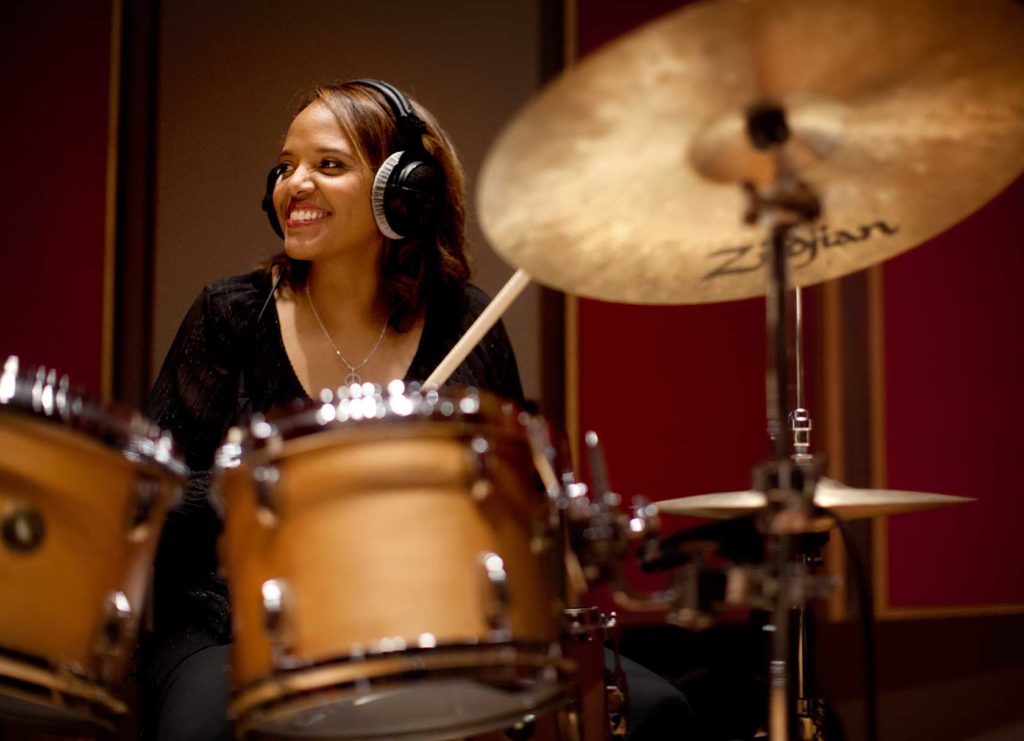
Terri Lyne Carrington released the album “New Standards, Vol. 1,” in July and followed this with a book, “New Standards: 101 Lead Sheets by Women Composers,” in September. The album, featuring Carrington, Kris Davis, Linda May Han Oh, Nicholas Payton and Matthew Stevens, is nominated for a Grammy Award for Best Jazz Instrumental Album.
Another of Carrington’s albums, “Live at the Detroit Jazz Festival,” released this year with Wayne Shorter and Esperanza Spalding, is also up for a Grammy in the same category.
As a composer, musician, and founder and artistic director of the Berklee Institute of Jazz and Gender Studies, Carrington has not only taken a lead in expanding the narratives in music, she also has created a collaborative model of inclusion. In doing so, the groundwork is set for increasing numbers of individuals to participate in cultural changes that will soon eclipse what has long been assumed to be true about jazz music.
“I included a lot of composers who people may not know about,” Carrington tells the Banner, “in order to provide them with wider recognition. All of them! For example, Sara Cassey, a great composer from Detroit, is on the album.”
Carrington’s decision to make an album of standards brings into focus the concept itself: What is a standard?
“Traditionally, standards were popular songs or Broadway tunes that musicians started interpreting,” Carrington says. “The next wave was musicians writing songs that then became standards. Musicians like Horace Silver, Wayne Shorter, John Coltrane. Thematic melodies that people remember and that other musicians wanted to play.”
To create an album of new standards, Carrington chose collaborators who could meld ideas that highlighted what had been missing. Matthew Stevens, composer and guitarist, co-produced the recording.
“Kris Davis and Linda May Han Oh are the perfect rhythm section,” Carrington says. “The album also features Ravi Coltrane, Elena Pinderhughes and Nicholas Payton, among others.”
Following up the album with “New Standards: 101 Lead Sheets By Women Composers,” Carrington decided to make participants out of musicians listening in.
“I wanted to have something in there for novices, as well as complicated music that is a challenge. No matter what level of musician, there are compositions that will resonate, from bebop to contemporary to Latin-inspired,” she says.
The album’s name includes “Volume 1,” and while there are no immediate plans for subsequent albums, Carrington hopes that this is just the beginning.
“The idea is to record all the songs in the book,” she says, “which would be amazing. I’d like to enlist other people to do that.”
When consideration is given to roles that gender plays in music, its constructs, the impetus of the projects of the album and book take shape imaginatively and pragmatically. But until that authority is established, Carrington notes that we just don’t know how things will turn out.
“Because of the omission of women,” Carrington says, “we don’t know what the differences are. My biggest point to make to my colleagues is, if you really care about the music and its equity, you have to be interested in gender equity.”








